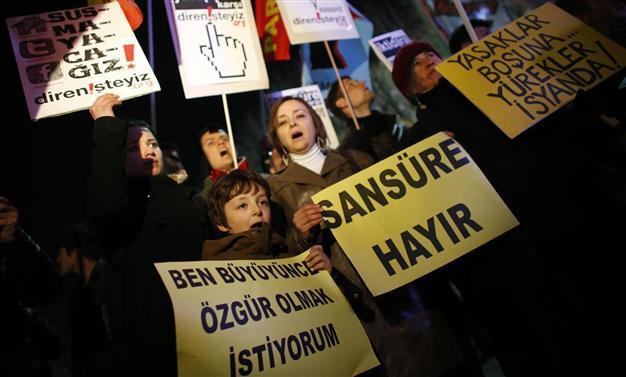Turkish government defends Internet bill with bilingual memo
ANKARA

Protesters shout slogans, hold banners and wave flags as they demonstrate against new controls on the Internet approved by Turkish parliament. REUTERS Photo
The Turkish government has released a memo in Turkish and English, arguing that its controversial Internet bill does not constitute censorship.
The memo seeks to explain “what Law No. 5651 brings” by accounting for its scope and defending its most criticized aspects. According to the government, the bill will introduce two separate procedures:
“In the event of an ‘infringement of individual rights,” such as slander, calumny, libel and abuse, the only institution with the authority to take a decision will be the penal court of peace. In such cases, the individual whose personal rights are claimed to be infringed will go to the penal court of peace and the judge will deliver the decision in 24 hours without a trial. If the decision is in favor of the complainant, access to the URL in question will be prevented in the next four hours by the Union of the Service Providers. The Union, by informing all of access providers, will prevent access to the specific URL, not the whole website.
“In the event of a breach of ‘a person’s privacy,’ such as illegal wiretapping and the sharing of personal data without consent, in order to prevent irreversible damage that could be caused by the “time lag” between the complaint of the individual and the decision of the court, the bill will make it possible to implement a temporary prevention of access. When an individual raises a complaint, the Presidency of Telecommunication and Communications will send the request to the Union of Access Providers, which will block the URL within the next four hours as a preventive measure.
“The complainant should also file his request to the penal court of peace within 24 hours and the decision of the court should be given within the next 48 hours. If the decision of the court is not in favor of the complainant, the restriction on access to the URL will be removed by the Union. Unless a decision by the court is not delivered to the Union within 48 hours, the restriction will be automatically removed.”
In the memo, the government defends the bill by claiming that it will improve current practises with measures such as removing prison sentences for content and access providers in certain cases. It also argues that citizens won’t be blacklisted as access providers, not a government agency, will be obliged to keep the traffic data of their customers for up to two years. This measure will therefore allow possible legal investigations using past evidence. “In fact, in EU member states, traffic data has been kept for time periods ranging from six months to two years,” the memo states.
The main opposition Republican People’s Party (CHP) has expressed the potentially grave impacts of the bill, maintaining that it will eventually serve as a step to further intensify censorship.
The memo rejects such allegations, and claims that the bill is related to the Gezi Park protests and the Dec. 17 anti-corruption investigations, two incidents that have infuriated the government.
The bill, which has passed from Parliament, is now pending the approval of President Abdullah Gül, who has until Feb. 25 to either sign it into law or veto it.
